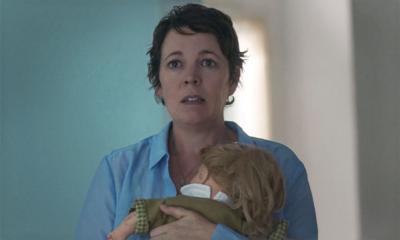Who wouldn’t want to spend a month by the Mediterranean — reading, floating, eating ice cream delivered by Paul Mescal? It’s a dream, really, and Olivia Colman seems like the perfect person to experience it on my behalf. She’s moody, curmudgeonly, occasionally stricken with joy by the warm Greek light or the sound of softly crashing waves. She’s an expert people watcher — and people watching is one of life’s great pleasures, especially on a beach.
But she’s sick, and so is the picturesque seaside town where first-time director Maggie Gyllenhaal sets The Lost Daughter. The surface-level serenity promised by the mere idea of beautiful, well-read people hanging out in Greece is just that — a promise, and one that is not kept even from the first moments of the film.
The Lost Daughter, and the 2006 Elena Ferrante novel on which it is scrupulously based, is a beach read in the literal sense. But in practice, both works are the antithesis of the beach read, leaving one considering life’s greatest regrets, the shortcomings of family and a dark sense of loss that is somehow both ambiguous and achingly specific.
Upon reading, the novel does not seem like a good candidate for adaptation. I’m a great fan of Ferrante’s work, and so the natural inclination is to reject someone else’s visualization of the intensely personal material. Her stories usually rely on the interior monologue of girls becoming women, sometimes prematurely, trying to make a place for themselves in a world that already knows what that place should be. They’re not about much of anything. But thanks to Ferrante’s unmatched world building, the tiniest detail — the rustling of leaves on an empty street, or the particulars of a dress’s hem — takes on the urgency of a thriller. We think of Game of Thrones or Star Wars when we talk about world building, but no one is better at it than Ferrante. It’s just that her worlds are overlooked, in part because there are no swords or spaceships, but mostly because they center women and the poor or formerly poor.
The only way, then, to adapt a Ferrante story is to cast people like Colman, who plays 48-year-old literature professor Leda, spending time alone in the seaside town on a “working holiday.” Colman, unlike a lesser actor, can use a grimace or longing glance to convey the pain or anxiety or yearning of the source material. Gyllenhaal turned to flashback to flesh out the rest of Colman’s character’s story, with the electric Jessie Buckley playing a younger version of the professor.
Gyllenhaal is right to leave the book more or less intact, and to turn its material unmolested over to masters like Colman. Her adaptation takes Ferrante’s Italians and makes them English speakers, though little is lost in translation, at least to someone who read it in translation to begin with. It might take an imaginative leap, but Gyllenhaal is also right to plop Mescal and Ed Harris into this small Greek town. Mescal is playing the Sally Rooney Extended Universe character he was meant to play, forever, and that’s just fine. In terms of adaptability, what the book does have is its brevity — no epic novel can be adapted for film to the satisfaction of its biggest fans — and Ferrante’s descriptions: a how-to guide for the actors on when to sweat and sigh and let their eyes droop.
Buckley and Colman are never on screen together, but the two unite to tell a radical story of motherhood. It’s not radical in the sense that it’s unusual. We just don’t see stories like this very often. At the movies or in life, motherhood is a virtue, a golden calf, something to be worshiped and pined for without question. To wonder whether you were right to have kids is not allowed. Regrets, pain and second guesses are brushed under the rug in favor of Rockwellian bliss. Buckley’s younger Leda finds some joy in raising her two daughters, but she doesn’t really come to life until an esteemed figure in her field sprinkles praise on her. Nothing could be better than that. But years later, sitting on a perfect beach, it’s not the praise she remembers. She can’t help but wonder what her daughters are doing. She can’t help but see herself in Dakota Johnson’s Nina, a young mother whose family and their problems interrupt the peace of the beach. Nina too is pained by the life that’s been given to her, even though she chose parts of it. Her daughter is inconsolable at the loss of a doll, and Colman’s Leda tries to help.
Their relationship, more than that of mother and daughter, creates the central drama of the film. They are the same in many ways, and they pursue one another like lovers. But like the actual mothers and daughters elsewhere in the story, their relationship is permanently scarred by willful transgressions.
“I’m an unnatural mother,” Colman’s Leda tells Nina, incorrectly.





